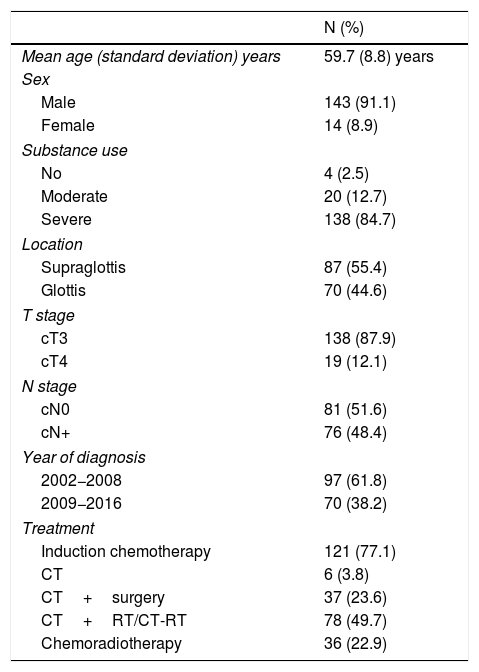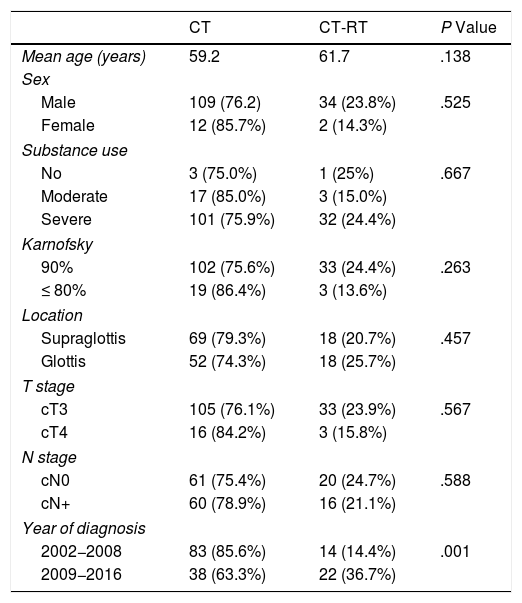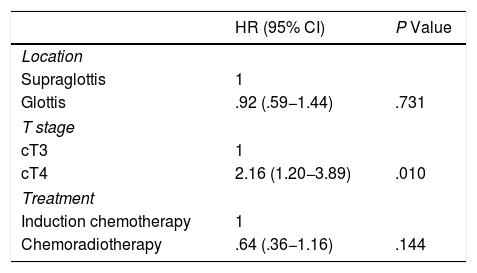A high percentage of patients with locally advanced laryngeal carcinoma are candidates for inclusion in organ preservation protocols. The aim of this study was to compare in actual clinical practice the results of two preservation schemes, induction chemotherapy versus chemoradiotherapy, in patients with locally advanced laryngeal carcinoma.
MethodsRetrospective study conducted in 157 patients with locally advanced laryngeal tumours (T3-T4) treated with induction chemotherapy (n=121) or chemoradiotherapy (n=36).
ResultsOf the 121 patients who started treatment with induction chemotherapy, 6 died as a result of toxicity, 37 were treated with surgery, and 78 completed the preservation scheme; 36 patients were treated with chemoradiotherapy. There was no significant difference in specific survival at 5 years according to whether the patients had started treatment with either induction chemotherapy or chemoradiotherapy (68.9% versus 75.7%, P=.259). A total of 45.9% of the patients achieved preservation of laryngeal function. There was a tendency for patients treated with chemotherapy to achieve laryngeal dysfunction-free survival at 5 years, which was higher than the patients treated with induction chemotherapy (55.6% versus 44.8%, P=.079).
ConclusionThe patients included in a preservation protocol achieved 45.9% laryngeal dysfunction-free survival at 5 years. No significant difference in specific survival was observed between patients treated with induction chemotherapy or chemoradiotherapy.
Un porcentaje elevado de pacientes con carcinomas localmente avanzados de laringe son candidatos a ser incluidos en protocolos de preservación de órgano. El objetivo del presente estudio es comparar los resultados de dos esquemas de preservación, quimioterapia de inducción versus quimio-radioterapia, en pacientes con carcinomas de laringe localmente avanzados en un contexto de práctica clínica real.
MétodosEstudio retrospectivo realizado en 157 pacientes con tumores localmente avanzados de laringe (T3-T4) tratados con quimioterapia de inducción (n=121) o quimio-radioterapia (n=36).
ResultadosDe los 121 pacientes que iniciaron tratamiento con quimioterapia de inducción, 6 fallecieron como consecuencia de toxicidad, 37 fueron tratados con cirugía, y 78 completaron el esquema de preservación; 36 pacientes recibieron un tratamiento con quimio-radioterapia. No existieron diferencias significativas en la supervivencia específica a los 5 años en función de que los pacientes iniciasen un tratamiento con quimioterapia de inducción o quimio-radioterapia (68,9% versus 75,7%, P=0,259). Un 45,9% de los pacientes consiguió una preservación de la función laríngea. Los pacientes tratados con quimio-radioterapia tuvieron una tendencia a conseguir una supervivencia libre de pérdida de la función laríngea a los 5 años superior a la de los pacientes tratados con quimioterapia de inducción (55,6% versus 44,8%, P=0,079).
ConclusiónLos pacientes incluidos en un protocolo de preservación consiguieron una supervivencia libre de disfunción laríngea a los 5 años del 45,9%. No se observaron diferencias significativas en la supervivencia específica entre los pacientes tratados con quimioterapia de inducción o quimio-radioterapia.










